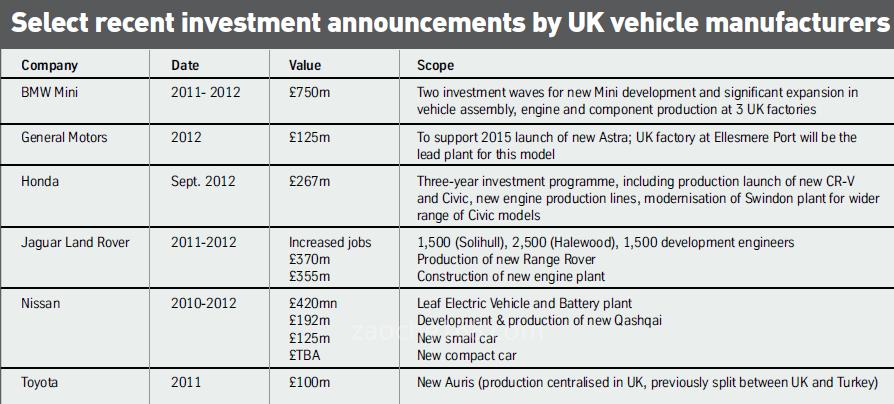2025年11月17日
海德声科2025年11月17日
深视智能2025年11月14日
配天机器人2025年11月14日
TE2025年11月14日
蔡司工业
2025年11月13日
埃尔森
2025年11月10日
BBS
2025年11月07日
劳易测
2025年11月06日
和利时
2025年11月14日
威图
2025年11月14日
TE
2025年11月14日
KUKA
2025年11月14日
先导智能
2025年11月14日
TDK
A recent survey on the UK’s shortage of skilled and semi-skilled labour highlighted problems that extend throughout the automotive production world, writes Simon Duval Smith
In recent years, several vehicle manufacturers have announced major investments in vehicle making within the UK, with Jaguar Land Rover, Nissan and BMW Mini expanding both model range and production. And while there have been some concerns over actual or potential plant closures and production slowdowns, Ford, GM, Honda and Toyota appear to remain committed to the UK.
As well as increasing vehicle production (and engine production at BMW, Honda and Ford), the OEMs are almost certain to increase component purchasing from UK suppliers, for both in-country production and in some cases for their other European plants.
UK vehicle production could soon reach 2 million units per annum (upa) and this could deliver some signifi cant opportunities for suppliers but there are problems: not only gaps in the supply base, as (for example) wheel and castings makers have either closed down or moved abroad, but also the serious issue of the lack of skilled labour.

Despite the likes of BMW Mini expanding its model range, lack of funding and a shortage of engineering talent still plagues the UK industry
Action required
It may seem odd to report on labour shortages at a time of high unemployment, but this is the reality that a recent report by industry consultants AutoAnalysis uncovered. While assisting Sunderland City Council develop its strategy to grow its automotive sector, based around the Nissan factory in Sunderland, it undertook a wide-ranging interview programme with UK suppliers.
Alongside concerns about a lack of fi nance, the overwhelming majority of suppliers reported that it was extremely diffi cult and unduly time-consuming to recruit experienced, skilled labour. Of the 40-plus supplier companies that AutoAnalysis spoke to in the North-East and the rest of UK, almost all report diffi culties in recruiting skilled labour,especially maintenance engineers, electrical engineers, and production cell managers.
The recruitment problem is worsened by extensive recruitment by major OEMs and lack of adequately skilled school leavers, insuffi cient apprenticeships and lack of graduate engineers.
Labour shortages not only cause problems for companies already in the UK, but also tend to discourage new investors from establishing plants and technical centres in the country.
The report concluded that actions required included the need to:
• Ensure industry has the labour force it needs
• Focus the education system more on the needs of industry
• Structure training schemes to be customer-led and understood – too many people do not know what help is out there

(AMS)